378: John Barnes, Newcastle United, Merlin’s Premier League 98 Official Sticker Collection
When
the dust settles from the Covid-19 pandemic it’s fair to say that some businesses
will be remembered more fondly than others. Aberdeen craft beer connoisseurs
BrewDog turned over one of their distilleries to make hand sanitiser for local
hospitals. Costa Coffee ensured their staff would be paid in full for at least
the first eight weeks of enforced closure. On the other hand, Tim Martin of
Wetherspoon’s made all of his staff redundant and told them to find a job in
Tesco whilst SportsDirect magnate, and current owner of Newcastle United, Mike Ashley
attempted to pressure his employees into working through the crisis by claiming
his shops provided an essential service. Suddenly our consumer choices are made
easier.
Mike
Ashley’s stewardship at Newcastle United has been wrought with drama and, while
the club has made a healthy profit, two relegations to the
Championship and a lack of investment in the playing staff (and no, Joelinton
doesn’t count) has made it hard for the Toon to break into the top-half of the
Premier League, let alone mount the significant title challenges synonymous with
the mid-1990s. Playing a thrilling brand of attacking football, the Newcastle
side of the early Premier League years won over the hearts and minds of neutral
supporters but fell just short of the ultimate prize and gave birth to one of
the greatest post-match interviews of all time courtesy of manager Kevin
Keegan. I’m sure you would love it if there was a link available for that (with
some expert analysis from Matt Le Tissier, Phil Thompson and Paul Merson for
good measure!)
The
struggle for Premier League supremacy took it’s toll on Keegan and Tyneside was
shocked when he resigned as manager of the Magpies in January 1997. His
replacement, Kenny Dalglish, had taken Blackburn Rovers from the old Second Division
to the Premier League title in the space of four years and, with his impressive
track record with a dominant Liverpool side in the 1980s, seemed the perfect
choice to improve the club’s fortunes. Dalglish enjoyed a successful first
half-season and Newcastle finished as runners-up to an imperious Manchester
United.
Determined
to stamp his own mark on the club, Dalglish was active in the transfer market
ahead of the 1997/98 season. Popular faces from the club’s back-to-back
second-place finishes such as Les Ferdinand, Peter Beardsley and David Ginola
were offloaded around the Premier League and replaced with sentimental
selections from the Scotsman’s Liverpool days. Enter John Barnes and Ian Rush
at a combined age of 70 alongside an ageing Stuart Pearce and, the time
honoured Sunday league tradition, the boss’ son, Paul.
The
fact that John Barnes was a fantastic footballer is indisputable but, by this
stage of his career, he was better known for his excellent white suits while
presenting ITV’s Champions League highlights than he was for the skill and
verve of his Watford and Liverpool days. To his credit, he contributed seven
goals across 39 appearances in all competitions as the Toon reached the FA Cup
Final and shocked Barcelona in the Champions League group stage. However, the
club’s Premier League form was average at best and they ended the season in a
disappointing thirteenth place. Within a month of the 1998/99 season Dalglish
was dismissed as manager of the club and, with only one substitute appearance
to his name, Barnes’ moved on to Premier League new boys, Charlton Athletic, in
February 1999. The Addicks were relegated back to the First Division on the
last day of the season and Barnes announced his immediate retirement from
football.
Newcastle
United finished the 1998/99 season in thirteenth place and made their way to a
second successive FA Cup final under Ruud Gullit. A poor start to the following
season cost Gullit his job but the club enjoyed a renaissance under the
avuncular stewardship of Sir Bobby Robson until his dismissal in 2004. Three
years later longstanding chairman Freddie Shepherd sold his remaining shares in
the club to Mike Ashley and the soap opera began. With the exception of the
traditional Pardew bounce (the football phenomena rather than the dance) in
2012/13 the club has struggled to reproduce the fabled form of the 1990s. The
rot may have set in back in the Dalglish days but when did Sir Kenny ever put
anyone on a zero-hours contract?





Comments
Post a Comment